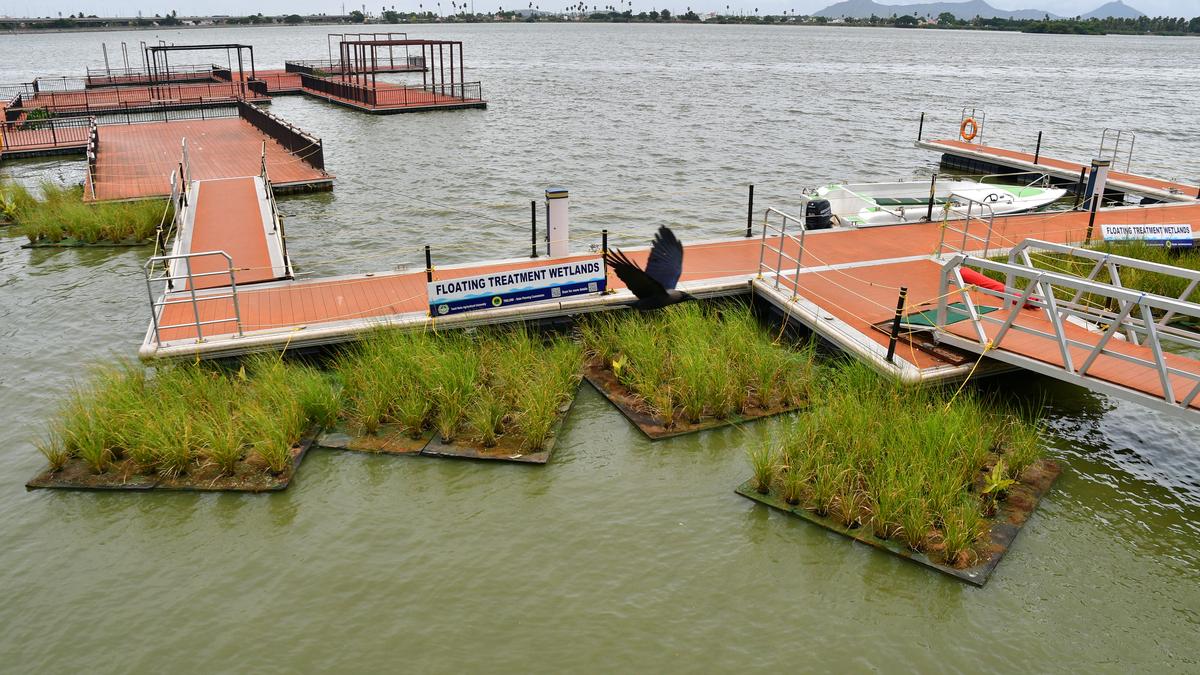
Floating vetiver islands in Coimbatore lakes to purify water
The Hindu
How do you ensure clean lakes and water bodies? A buoyant hydroponic platform with vetiver plants could well be the answer
Always brimming with water, the Ukkadam Big Tank or Periyakulam is the city’s pride. Spread over 120 hectares and one of the foremost tanks of River Noyyal, it offers a pleasant and tranquil view of the cityscape, a quiet retreat from the urban buzz. The placid waters attract as many as 100 species of birds, a feat documented on e-bird portal. Common sandpipers, the migratory bird, stops by regularly at the lake during the winters. Falcons and Ospreys are also sighted along with pin-tailed ducks, Garganeys and Northern shovellers. However, the water is highly polluted with sewage.
While a sewage treatment plant is mandatory to check the pollution, a team of researchers led by scientist Kamaludeen Sara Parwin Banu, Professor in Environmental Sciences, from the Tamil Nadu Agricultural University, installed vetiver floats at the lake, a novel experiment aimed at a solution towards clean water bodies.
Called TNAU floating treatment wetlands, this man-made structure with a buoyant hydroponic platform or a float that can hold 84 plants, was used on the lake on a pilot basis. “Our main objective was to standardise and fabricate massive floats for lakes, to study its buoyancy and how best this can be used as a sturdy platform for long-term usage in lake clean-up exercises,” says Sara adding that the buoyant float has now won a design patent, much to their excitement. “We installed as many as 10 floats and studied their sturdiness for 16 months from January 2023 to March 2024. We chose vetiver based on our research over the years on the efficacy of vetiver roots as water filter,” she explains adding that the feasible design can be scaled up as it can be fabricated quickly compared to other treatment wetlands. While a demonstration unit has been set up at TNAU — Horticultural Research Station in Yercaud, there are discussions to pilot other lakes in Yercaud, Udhagamandalam, Sivakasi and Puducherry.
Considered a green and environmental friendly wastewater treatment technology as well as a natural recycling method, vetiver when grown under land and aquatic conditions has an extremely high tolerance level for pollutants, particularly nitrate and phosphate, as well as most heavy metals that most other plants cannot tolerate. “Vetiver’s deep and massive root system takes on the job of removing pollutants from water bodies. In Ukkadam lake, eutrophication or greening of lakes is an issue because of nitrates and phosphates in sewage that is let in. Vetiver is scientifically proven to remove these chemicals making the water clean for aquatic life as well,” explains Sara.
The plant has long been used for various applications including the making of perfumes, soaps, and cosmetics. In coastal belts such as Puducherry, farmers grow vetiver in several acres of land. The Indian Vetiver Network guides them on methods of extracting vetiver oil. “The roots harvested from Periyakulam will be used to study its use as resource material to make handicraft items. The tricky part was the platform. Though it is similar to a hydroponic float we attempted using coir bedding, the floats are now proven to withstand all vagaries like heavy winds, rains, sun and real time challenges. We also created a mini pond at the TNAU campus with 25,000 litres of water pumped from the Ukkadam Lake to check how efficient the roots are in removing pollutants,” says the project head.
Research on vetiver has been an ongoing process for the last seven years, recalls Sara. “When one of our reports confirmed its efficiency in removal of heavy metals including carcinogenic chromium, I became a fan of vetiver. While taking part in an international conference in Thailand, I learnt that vetiver floats are already being used there to remove pollutants from water bodies. In India, our success story is a good beginning.”

How do you create a Christmas tree with crochet? Take notes from crochet artist Sheena Pereira, who co-founded Goa-based Crochet Collective with crocheter Sharmila Majumdar in 2025. Their artwork takes centre stage at the Where We Gather exhibit, which is part of Festivals of Goa, an ongoing exhibition hosted by the Museum of Goa. The collective’s multi-hued, 18-foot crochet Christmas tree has been put together by 25 women from across the State. “I’ve always thought of doing an installation with crochet. So, we thought of doing something throughout the year that would culminate at the year end; something that would resonate with Christmas message — peace, hope, joy, love,” explains Sheena.

Max Born made many contributions to quantum theory. This said, he was awarded the Nobel Prize for physics in 1954 for establishing the statistical interpretation of the ____________. Fill in the blank with the name of an object central to quantum theory but whose exact nature is still not fully understood.











